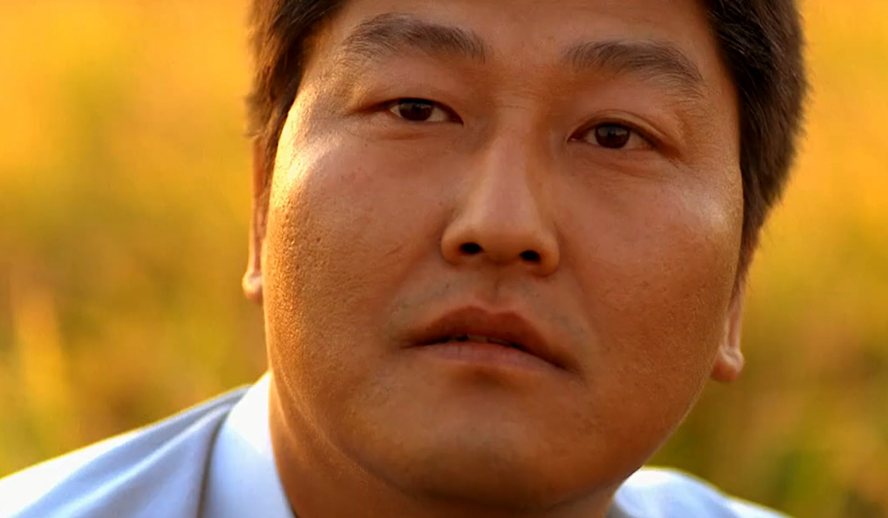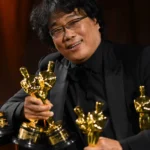
Photo: ‘Memories of Murder’/Neon
Koreans tend to refer to significant political events by date, similar to how we refer to 9/11- for instance, 6/25 (pronounced YuGiOh, just like the Japanese card game, which is frankly a little suspect) refers to the Korean war, 4/19 (sailgu) refers to the April 19 Revolution of 1960, and 5/18 (oilpal) refers to the Gwangju Uprising of 1980, or, as it has been otherwise called, the Gwangju Massacre.
It’s little known in the West, as is most of Korean history, but it set the tone for the decade to come. After the dictator Park Chung-hee (father of recently impeached South Korean President Park Geun-hye) was assassinated in 1979, General Chun Doo-hwan installed himself as dictator via the Coup d’etat of December Twelfth (12/12) and shortly thereafter focused his attention on suppressing the pro-Democracy movement taking place in the city of Gwangju.
Related article: Must-Watch: ‘Mother’ – A Captivating Thriller By Oscar-Winner Bong Joon-ho
Related article: ‘Snowpiercer’: A Bong Joon-Ho Gem Driven to Success By an Emotional Chris Evans
The result? Official figures put the death toll at 144 civilians killed, 22 troops killed. Anyone who disputed those numbers could be arrested for “spreading false rumors.” However, Gwangju recorded 2,300 more deaths than the monthly average for the month of May, so who knows exactly where the truth lies.
Police brutality was also so widespread at the time that it became commonplace. Any one reported incident is but a drop in the bucket, but there is a rather famous incident in 1987 when 21-year-old university student Park Jong-chul was tortured to death during an investigation over his alleged anti-government activities, sparking what would be known as the June Democratic Struggle.
Why am I digging up all this history? Well, because Memories of Murder, Bong Joon-ho’s crime drama about Korea’s first serial killer, takes place in 1986. Unfortunately, the historical and cultural context is almost entirely lost on Western audiences, yet it’s still regarded as one of the greatest films ever made. Interesting how that works.
My review of this film isn’t the first to exist, and it certainly won’t be the last, but I seldom see a review tackle the film from a historical perspective. Detective Park Doo-man, portrayed by Song Kang-ho, is blatantly corrupt, and undoubtedly a satirical portrayal of the police of the time, yet I’ve read some reviews that simply characterize him as “a misguided cop who ultimately cares about justice,” which, to me, is almost like reading a review of Casablanca where the reviewer doesn’t know what Nazis are.
Nevertheless, the film has an enduring legacy, which speaks to Bong’s ability to craft a powerful narrative that’s independent of the social context. However, without that knowledge, I believe much of the satire and social commentary, which Bong deftly weaves into the cop procedural, is lost.
In celebration of Memories of Murder recently becoming available to stream on VOD, I hope to shed some light on aspects of the film that are overlooked, so that future audiences may have a deeper appreciation for this rightfully-labeled masterpiece.
Subscribe to Hollywood Insider’s YouTube Channel, by clicking here.
The Times Are-a Changin’ Too Fast to Keep Up With
The film begins with Detective Park investigating the body of a dead, violated woman who’s been stuffed into a drainage canal. Some of the village children ruin the crime scene by playing with the dead woman’s clothes, and as Park yells at them not to touch, a little boy who’s been watching Park begins parroting his words, to his annoyance.
In humorous ways such as this, Bong pokes fun not just at an incompetent police force, but at the ways in which a rapidly developing society is at odds with the historically rural people. One of the upsides of living under the contemporary military dictatorship was that the economy developed rapidly, which modern Korean conservatives point to while reminiscing about “the good old days.”
However, the cities developed at a much faster pace than the villages, such as the one in which this story takes place, and further conflict arises when a more educated, experienced, and honest detective named Seo Tae-yoon, played by Kim Sang-kyung, arrives from Seoul to help investigate.
Because the village people are poorly educated by developing standards, there is no system in place to deal with crime scenes, nor an understanding that evidence should be carefully dealt with. A footprint is left at the scene of the next murder but a tractor drives over it, ruining it. To compensate, Park takes the shoe of his first suspect, a mentally handicapped young man named Baek Kwang-ho (played by Park No-shik), plants a new footprint, and takes a photo for evidence.
Back at the police station, we are introduced to Park’s partner, detective Cho Yong-koo, played by Kim Roe-ha, who greets Baek with a powerful flying kick to the chest that sends the boy tumbling, while Park casually hands him a cozy for his boots that’s clearly used routinely to dampen the physical evidence of abuse.
Related article: The Power of Positivity: Ikorodu Bois + Chris Hemsworth + Russo Brothers + Sam Hargrave
Limited Time Offer – FREE Subscription to Hollywood Insider – Click here to read more on Hollywood Insider’s vision, values and mission statement here – Media has the responsibility to better our world – Hollywood Insider fully focuses on substance and meaningful entertainment, against gossip and scandal, by combining entertainment, education, and philanthropy.
Park and Cho are bad cops. But it speaks to Bong’s direction and Song’s ability as an actor not only to play it all for laughs but to make Park a likable character. It doesn’t sound very funny when I just type out what happens, does it? Bong makes it explicit that these detectives are not a few bad apples, but emblematic of the entire system. At numerous points throughout the film, different characters express that it’s a well-known secret that the police torture suspects into giving rehearsed confessions, and only after journalists begin hounding the department does their sergeant Shin Dong-chul, played by Song Jae-ho, crackdown on their improper behavior, particularly the more violent Detective Cho.
‘Memories of Murder’ – The Social Hierarchy that Encouraged and Enabled Violence
At some point, you may notice that kicking seems to be the primary mode of physical assault in the film. This is because every healthy, Korean adult man is a black belt of Tae Kwon Do. I know this sounds like a blatant racist epithet, but it’s true. South Korea is like Israel in that, due to its close proximity with enemy states, military service is compulsory for every man once he reaches the eligible age. Tae Kwon Do is part of this training, and more so than most martial arts, focuses heavily on kicks.
Why am I bringing this up? Partially because I’ve seen praises for the effortlessly athletic jump kicks which occur at various points throughout the film, which, without context, might be mistaken as unique, comedic choices by either the director or the actor. While they’re certainly played effectively for laughs, it’s another aspect of the film that’s instinctively understood by Koreans, but lost on Western audiences. Another one that’s lost is the strict hierarchy of respect in Korean society, which can be gleaned from the film just by paying attention to the way various characters interact, but which I still feel the need to explain.
In Korea, the older you are, the more respect you’re afforded. To anyone older than you, you always use Jondaemal, which is a form of the Korean language that is essentially respectful speech. To those younger than you, you use Banmal, which is informal. The difference in language used is only the tip of the iceberg when it comes to how a social hierarchy informs behavior, and age is not the only determining factor- another is your job, and gender.
Recently, Korean youth have been emboldened by Western ideas and embittered by a society so competitive, hopeless, and difficult to succeed in that they sometimes refer to the country as “Hell Joseon” (Joseon being an older name for Korea). More and more young people have increasingly rebellious attitudes towards classic power structures, and in turn, some of the older generations have taken issue with what they consider disrespectful.
Related article: Hollywood Insider’s CEO Pritan Ambroase: “The Importance of Venice Film Festival as the Protector of Cinema”
Related article: The Masters of Cinema Archives: Hollywood Insider Pays Tribute to ‘La Vie En Rose’, Exclusive Interview with Director Olivier Dahan
However, in the time of Memories of Murder, these traditional power structures go unchallenged. In one scene, after the trio of detectives and their sergeant discover another gruesome female corpse, they blow off some steam at a restaurant, which is owned by the father of Kwang-ho, the mentally handicapped boy they had earlier beaten and tortured.
In this scene, despite what they did to his son, the father behaves with servility, bowing, smiling, and speaking formally, waiting on the policemen as they dine on meat. Midway through the meal, Kwang-ho tumbles out of a closet that he had been sleeping in, to the surprise of the detectives. Park gives him a playful slap on the face, and Cho scolds him, reminding him that he beats him because he cares.
It’s no wonder that the younger generation is rebelling against traditional social hierarchies when it becomes evident that abuse of power not only occurs regularly but is facilitated by deeply-ingrained social structures. Replace the characters with American police and people of color, and it sounds starkly relevant today.
Detective Park is an incompetent, arrogant man who believes he deserves respect based purely on his gender, age, and position- and society gives it to him. Of course, as the film progresses, he gains self-awareness and undergoes a change, but this initial incompetence causes more women to be raped and murdered, and I believe this is at the core of the satirical elements of the film.
Bong Joon-ho and Song Kang-ho achieved something truly brilliant together, as they would continue to do with future collaborations including The Host, Snowpiercer, and Parasite, the latter setting records and bringing international cinema to the forefront. The fact that Memories of Murder has been so highly regarded despite a lack of widespread cultural and historical contextual knowledge speaks to the masterful level to which the emotional story is portrayed. Knowing the context only adds another layer of subtext, and it comes together as something comedic, haunting, and unforgettable.
By Daniel Choi
Click here to read Hollywood Insider’s CEO Pritan Ambroase’s love letter to Black Lives Matter, in which he tackles more than just police reform, press freedom and more – click here.
An excerpt from the love letter: Hollywood Insider’s CEO/editor-in-chief Pritan Ambroase affirms, “Hollywood Insider fully supports the much-needed Black Lives Matter movement. We are actively, physically and digitally a part of this global movement. We will continue reporting on this major issue of police brutality and legal murders of Black people to hold the system accountable. We will continue reporting on this major issue with kindness and respect to all Black people, as each and every one of them are seen and heard. Just a reminder, that the Black Lives Matter movement is about more than just police brutality and extends into banking, housing, education, medical, infrastructure, etc. We have the space and time for all your stories. We believe in peaceful/non-violent protests and I would like to request the rest of media to focus on 95% of the protests that are peaceful and working effectively with positive changes happening daily. Media has a responsibility to better the world and Hollywood Insider will continue to do so.”
Vote with a conscience – Register to Vote – Your vote saves lives and ends systemic racism
Ways to support Black Lives Matter Movement to end systemic racism
More Interesting Stories From Hollywood Insider
– Want GUARANTEED SUCCESS? Remove these ten words from your vocabulary| Transform your life INSTANTLY
– Compilation: All James Bond 007 Opening Sequences From 1962 Sean Connery to Daniel Craig
– Do you know the hidden messages in ‘Call Me By Your Name’? Find out behind the scenes facts in the full commentary and In-depth analysis of the cinematic masterpiece
– A Tribute To The Academy Awards: All Best Actor/Actress Speeches From The Beginning Of Oscars 1929-2019 | From Rami Malek, Leonardo DiCaprio To Denzel Washington, Halle Berry & Beyond | From Olivia Colman, Meryl Streep To Bette Davis & Beyond
– In the 32nd Year Of His Career, Keanu Reeves’ Face Continues To Reign After Launching Movies Earning Over $4.3 Billion In Total – “John Wick”, “Toy Story 4”, “Matrix”, And Many More
Memories of Murder, Memories of Murder, Memories of Murder, Memories of Murder, Memories of Murder, Memories of Murder, Memories of Murder, Memories of Murder, Memories of Murder, Memories of Murder, Memories of Murder, Memories of Murder, Memories of Murder, Memories of Murder, Memories of Murder, Memories of Murder, Memories of Murder, Memories of Murder, Memories of Murder, Memories of Murder, Memories of Murder, Memories of Murder, Memories of Murder, Memories of Murder, Memories of Murder, Memories of Murder, Memories of Murder, Memories of Murder

Daniel Choi is a writer who’s currently pursuing a BA in Film & Television from New York University. With a background in amateur film production, Daniel is fascinated by how artists’ cultural backgrounds inform their work, subconsciously or not, and how that work is then perceived by different audiences across time and space. He joined Hollywood Insider to promote its mission statement of substantive entertainment journalism, and hopes to enrich readers’ understandings of cinema through insightful analysis.








